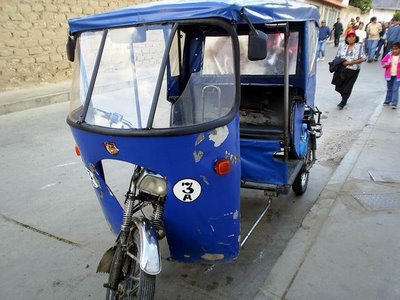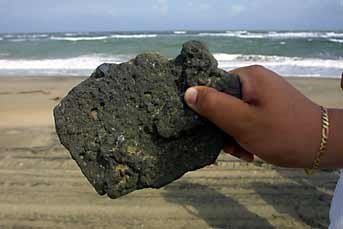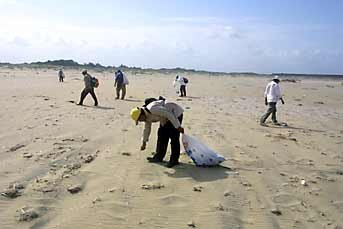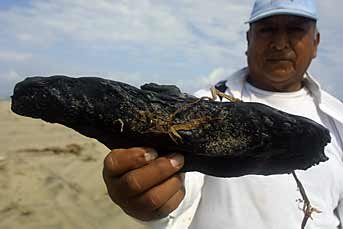Do you remember the United Fruit Company, now Chiquita Brands International? This is the company made notorious for its past practises of bribing corrupt Central, South American and Caribbean dictators to grant it favorable tax rates, excuse its land holdings from a myriad of Latin American land reform programs, grant it control over transportation routes and aid it in acquiring dozens of other businesses up to and including the Guatemalan Postal service and engineering the forceful overthrow of at least one Latin American government. The company was even mentioned in the
Godfather II movie when Cuban dictator Batista was supposedly presented with a solid gold telephone.
Chiquita/United Fruit is back in the news. The company admitted in federal court that it paid several million dollars in "protection" (extorsion) money to various Columbian terrorist groups between 1997 and 2004, when Chiquita sold out its banana interests in Columbia. The admission was part of a plea deal with federal prosecutors which will include the payment of a 25 million dollar fine.
Chiquita admitted paying the money to both left-wing and right-wing guerrilla armies and paramilitary forces, then of using a variety of accounting tricks to hide the payments. The money was paid to the right-wing paramilitary army, the AUC, listed in 2001 by the US State Department as a terrorist organization. The AUC is blamed for some of the bloodiest massssacres of Columbian peasants during the long civil war which has been fought there.
About the same amount was paid over the same time period to the ELN and the FARC, the left-wing guerrilla armies that control a huge swath of Columbian territory. The AUC, the ELN and the FARC are now the principal exporters of Columbian cocaine.
Chiquita's lawyer claimed that the money was paid as protection money to safeguard the company's workers. Chiquita says it was approached with dark threats concerning its workers safety and felt it had no choice but to pay. The money was paid initially by check but later payments were made in cash. Chiquita officials at the highest levels of the company were involved and Columbia is now making noise about extraditing them to that country to face trial for supporting terrorism.
"I am Chiquita Bah-nah-nah and I come to pay-ay."Chiquita's payments, while authorized at the highest levels, were not authorized by the board of directors. When the State Department listed the AUC, ELN and the FARC as terrorist organizations, making it illegal to do any business with them, Chiquita played dumb and continued the payments. Only when a low ranking Chiquita employee discovered the payments and officially notified company executives (most of whom already knew all about it) was any action taken.
Apparently, company officials went to "outside counsel" seeking advice. They were told to stop the payments immediately as such payments were an indefensible violation of US law. Company officials pointed out to their outside counsel that the safety of their employees as well as security of the company's installations in Columbia would be put at risk. The counsel's response? "Get out of Columbia". This article gives the
actual quotes from that outside counsel, apparently gleaned from court documents.
"Must stop payments."
"Bottom Line: CANNOT MAKE THE PAYMENT"
"Advised NOT TO MAKE ALTERNATIVE PAYMENT through CONVIVIR"
"General Rule: Cannot do indirectly what you cannot do directly"
Concluded with: "CANNOT MAKE THE PAYMENT"
"You voluntarily put yourself in this position. Duress defense can wear out through repetition. Buz [business] decision to stay in harm's way. Chiquita should leave Colombia."
"[T]he company should not continue to make the Santa Marta payments, given the AUC's designation as a foreign terrorist organization[.]"
"[T]he company should not make the payment."
Company officials then visited the Justice Department and admitted making the payments. Chiquita could only get an admission from the Justice Department that the issue of security was "complicated". However, Justice told Chiquita that the payments must stop. Instead, Chiquita made at least another $800,000 in payments while it negotiated with a Columbian company to buy Chiquita's Columbian banana operations. Chiquita sold its Columbian subsidiary, called Banadex, Chiquita's most profitable operation, to the Columbian buyer.
However, the company's repeated payments to registered terrorist organizations in violation of US law, its continued payments even after being advised by both outside counsel and Justice Department officials to discontinue the practise immediately, and its efforts to hide those payments, whether by check or by cash, led to the prosecution and the plea agreement.
What a tortured history has Chiquita.
1871: Railroad magnate Henry Meiggs signs agreement with Cost Rican government to build a railroad from capitol to coastal port.
1877: Meiggs dies and his nephew, Minor C. Keith, who had been assisting in the project, takes over. Keith had been planting bananas along the route and was making a good little bit of money on the side.
1882: Costa Rica defaults on payments to the railroad company. Keith has to borrow 1.2 million from UK and US banks to continue the project.
1884: Costa Rican government gives Keith 800,000 acres along the railroad and a 99 year lease to operate the railway.
1899: Keith loses $1.4 million when a stock broker goes broke, forcing him to merge with the Boston Fruit Company, forming United Fruit Company,. now headquartered in Boston.
1890: Rairoad is finished but Keith makes more money from bananas than from rail traffic.
1901: Guatemala hires United Fruit to manage its postal service.
1930: By this time, United Fruit was the largest employer in Central America and had eaten at least 20 rival fruit companies.
1930: In 1930, Sam "Sam the Banana Man" Zemurray sold his Cuyamel Fruit Co. to United Fruit.
1933: Zemurry led hostile takeover of United Fruit due to the company's poor management. He moved the headquarters to New Orleans and ran the company until 1951.
1954: Guatemala's president overthrown by CIA backed military after United Fruit executives convinced Allan Dulles, his brother John Foster Dulles and Presidents Truman and Eisenhower that president Jacobo Arbenz Guzmán was a commie. Arbenz was actually a reformer who really intended to implement land reform. He had told United Fruit that the government would buy the company's uncultivated land for the value as declared on the company's tax returns, probably about $0.09 per acre. United Fruit's position was that it had to hold large tracts of uncultivated land to protect it from the loss of banana plantations from hurricanes, a not infrequent occurrence (check with Ray Nagin).
1958: The Eisenhower administration, apparently now angry at United Fruit, instituted antitrust actions against the company, eventually forcing it to sell all its Guatemalan holdings.
1959: All of United Fruits Cuban holdings, including banana and sugar plantations, sugar mills, highways and railroads, are expropriated by Fidel Castro.
1968: Corporate raider Eli M. Black buys 733,000 shares of United Fruit, becoming the company's largest shareholder.
1969: Zapata Corp. takes control of United Fruit.
1970: Black merges United Fruit with his own AMK and creates United Brands.
1975: Poor management by Black as well as bad luck with weather causes Black to leap out of the 44th floor window of his office in the Pan Am Building in NYC. The sudden stop at street level kills him.
1975: SEC uncovers plot by United Brands to pay $2.5 million in bribes to Guatemalan president Oswaldo López Arellano to protect the company's remaining holdings from land reform proposals and export taxes. Trading in UB stock is halted and López Arellano's administration likewise is halted by a military coup.
1984: Carl Lindner's American Financial takes control of United Brands, renames it Chiquita International, and moves it to Cincinnati.
It is amazing that this outfit has managed to survive at all.
Now, as they say, for the other side of the story.
First, and foremost, let me make it perfectly clear that businesses, be they homegrown or foreign, do not force a country's government officials to take multi-million dollar bribes at the point of a gun. And when Company A from France, where this is quite legal, and Company B from Germany, where this is also quite legal, sit down and start throwing around cash, Company C from America, where this is most assuredly illegal, has little choice but to play.
Let me also make it clear that the constitutions and laws in Central and South American countries, along with the staggeringly huge and inept bureaucracies those constitutions and laws have created, make it inevitable that businessmen will play just as dirty as the locals want to play. It's a given. If you want to survive in business in Central and South America, you have to do it under the table.
Secondly, United Fruit Company, through all its permutations, has probably done more for the country of Guatemala and its people than all the duly elected presidents, military dictators and juntas that have ruled it all these many years. Throughout the 60's and 70's, United Fruit Company sold off its Guatemalan holdings, bit by bit, to small, local fruit companies from which United Fruit continued and yet continues to buy bananas. United Fruit was its own, private, SBA.
The company, throughout its long, tortured history in Guatemala, as well as the rest of Central and South America and the Caribbean, built highways where there were none, built railroads where there were none, built schools where there were none, provided rent free housing to its employees who had none, waged successful warfare against the mosquito and the malaria it carried when various governments waged none, provided millions of jobs where there were none, paid millions of dollars to protect those employees when their own governments could provide none, built ports where there were none, constructed and operated sugar refineries where there were none, etc., etc., etc.
Because of a few wrong headed, bone headed and illegal decisions made by management up and down the line, over a history of 125 years, United Fruit became a favorite target of leftist propagandists. And, once again, the latest permutation of United Fruit Company is in the news and being whacked by a federal judge for doing something the company believed it was justified in doing, which was completely legal when it started, but it just didn't stop when it should have.
One must ask the this question: Had Chiquita stopped the protection extorsion payments when the US government made them illegal, how many Chiquita employees would have been murdered and how many more would be out of work due to destroyed installations or simply out of fear for their lives? Who knows?
Before throwing too many rocks at Chiquita banana, answer that question.
Please visit the Pale Horse Galleries online store
for art, gifts and collectibles -- all hand made
by Mexican indigenous artists.
Thanks! Cross posted at Pale Horse Galleries
TAGS: Oaxaca, Mexico, Oaxaca teachers strike, Pale Horse Galleries, gifts, collectibles, Mexican arts and crafts, Chiquita, United Fruit Company





